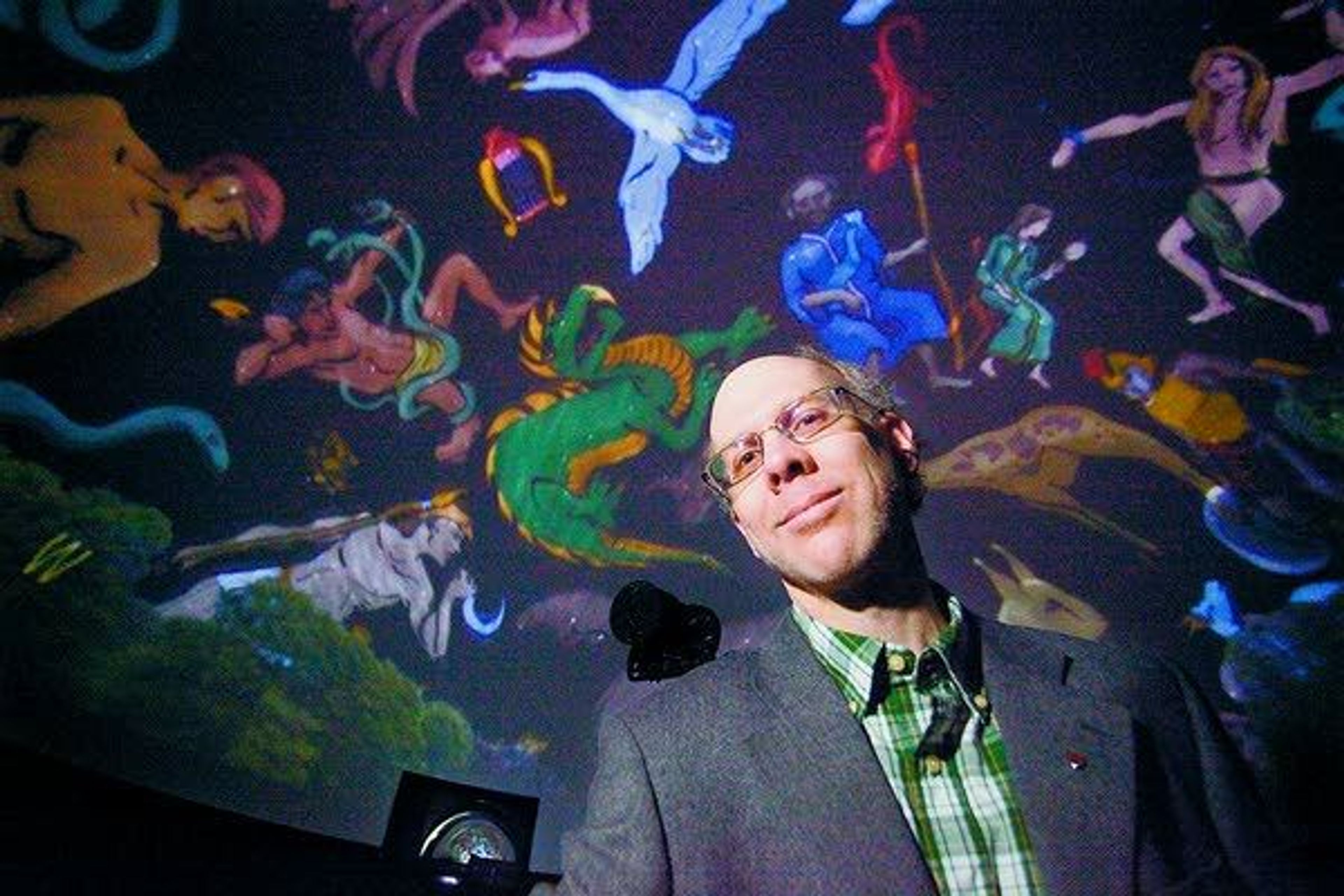WSU Planetarium director likes to gazes upward
Allen embraces new technology to teach about the universe
When Michael Allen was 4 years old, his mother gave him a book about astronomy.
He still has it, and despite the book's worn pages, it still holds a privileged place on his bookshelf.
Since receiving that book, he knew exactly what he wanted to do in life.
"I never wanted to be anything other than an astronomer," he said.
Now, Allen, 45, is the co-director of the Washington State University Planetarium on campus. The planetarium is a small room that allows students and the public to gaze at digital projections of the universe. The images are projected onto a 24-foot diameter, plastic-laminated glass-fiber dome.
At the center is a mechanical projector built in 1968, which will soon be replaced by a computerized LCD projector that uses a spherical mirror to display images. It can show what the sky looks like right now, as well as during each of the four seasons. It can also show planets and constellations, and the mythical creatures and heroes those constellations resembled to people of Roman, Chinese and Egyptian cultures.
Allen said it can even show Earth's seismic activity and weather patterns.
Students in the astronomy program learn how to run the planetarium and teach with it, not only to learn more about their field but to practice their public speaking skills, Allen said.
It is available for public events and educational field trips for local schools. There is usually a theme, such as Roman Mythology, planets or meteors. The shows are often accompanied by music.
One day, Allen said, he hopes to have a Native American theme, where local tribe members come and talk about how the stars play a role in their culture.
Allen feels right at home in the room, as renderings of Roman gods on the screen look down at him from the stars. He can't put a finger on exactly why the universe fascinates him so much, but he can speculate.
"For some people, the ideas of vast spaces, large objects, unimaginable distances, that's appealing to some people and I guess that appeals to me," he said.
It also has an aesthetic appeal. Images of planets, moons and constellations are "just pretty," he said.
"Astronomy is as much an art as it is a science, for the visual appeal," he said.
Those images are powerful teaching tools, he said, and the ability to gather information from those images is an applicable skill set that astronomy students can use in other fields. Forensic imaging and medical imaging, for example, require that ability, he said.
Another plus to being an astronomer, he said, is how it becomes a terrific ice-breaker. When people ask Allen what he does for a living, he can give them a unique answer.
"Sometimes that turns people right off and they think they can't talk to you," he said. "But for most people, I find they have a question."
The most common questions usually involve black holes, horoscopes, the fate of the sun and, of course, extraterrestrials.
For anyone curious, Allen does believe there is extraterrestrial intelligence out in space, but it's likely located "awfully far away."
His line of work also attracts people who like to share their own ideas on space, no matter how out-of-left-field.
"People have their own theories about the universe," he said. "You know, the bogus, the completely crackpot, and yet they amuse the heck out of me."
He said one person was convinced life originally began on Venus. Then, after the planet collided on Mars, life was somehow "shaken onto Earth."
"I had somebody, with a straight face, explain that to me many, many years ago," he said.
Allen has his own opinion on space, and particularly on the future of space travel.
He wants to see continuing advancements in robot and fuel technology that can send spacecraft to the furthest reaches of the solar system. These advancements would not only benefit space exploration, but more efficient fuel, for example, could also solve some problems on Earth.
He also wants to see more research on the moon. It's the closest object to Earth, yet it remains largely unexplored, he said. He believes it could tell us something about the history of the solar system, and maybe the history of our planet.
As for sending humans out of orbit, Allen said, it would be wise to put that on hold until space travel gets safer and easier.
"I would love to see humans in space, but realistically, I think it's very dangerous, and I think it really is an unnecessary risk at this stage," Allen said.
Meanwhile, it seems Allen's feet will remain planted on Earth and in Pullman. Allen and his family moved here 13 years ago after he earned his graduate degree at the University of Toronto. Once he got a taste of WSU and the community, he knew it was the right place to move.
"WSU was the best fit, I think, for me," he said. "I enjoyed the people, I liked the size of the school, I like the smallness of the community."
It's funny how someone who enjoys a community so small is fascinated with a universe so big.
Anthony Kuipers can be reached at (208) 883-4640, or by email to akuipers@dnews.com.

